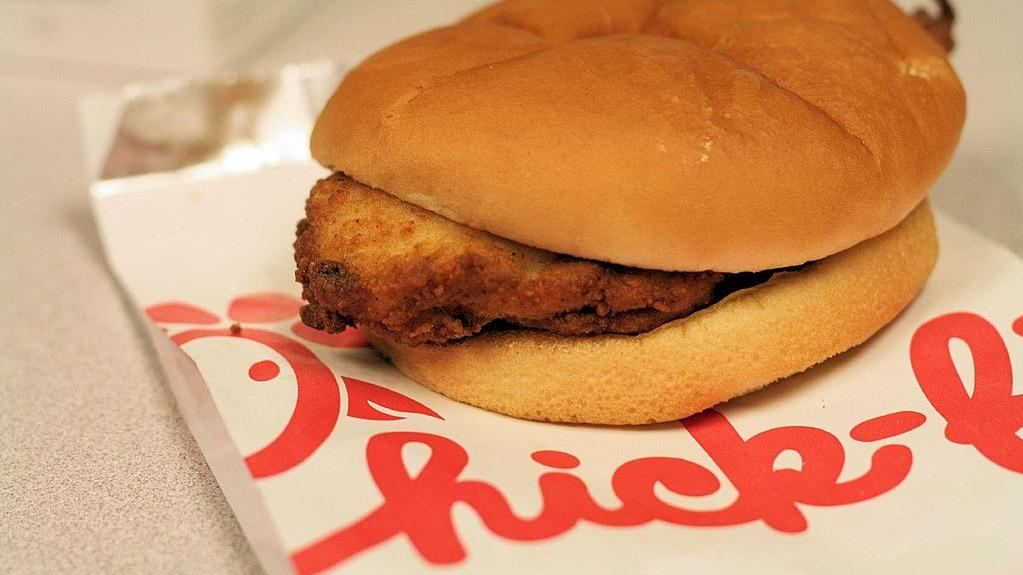New York Takes Aim At Chick-Fil-A's Sunday Hours
Chick-fil-A is closed on Sundays, which has caused problems along the New York State Thruway.
New legislation proposed in New York State would require eateries in state-owned New York State Thruway rest areas to operate seven days a week. If adopted, the legislation would put the state in conflict with a newly installed vendor at several of its Thruway rest areas: Chick-fil-A, a fast food chain famously closed on Sundays.
An ongoing $450 million redesign of the Thruway's rest areas has resulted in several of those rest areas getting new eateries, including Shake Shack and Chick-fil-A. The installation of the latter has inspired backlash from some members of the state's governing body, as well as the public, due to the company's anti-LGBTQ stance and its policy of closing its stores on Sundays.
Sunday closures are particularly notable in the context of a Thruway rest area, because Sundays see increased travel crowds, many of them hungry. Although the rest areas are required to provide other food options, as Chris Churchill points out in the Times Union, one restaurant closure at a rest area has a ripple effect.
"While it isn't as though anyone will go hungry because Chick-fil-A closes — the recently rebuilt New Baltimore rest stop, for example, also features a Shake Shack, Panera Bread and Starbucks — it's logical that having one outlet shuttered means longer waits at the others," Churchill writes.
Why Chick-fil-A should open on Sundays in New York
Assemblyman Tony Simone, who sponsored the bill, told The Hill that multiple food options are to be reasonably expected at a rest area. He expressed this with a quote that made me wonder whether his in-laws should be offended: "You know, we get hungry when we're traveling. We may not like our brother-in-law or sister-in-law's cooking and wanna get a snack on Christmas Eve," Simone said. "To find one of the restaurants closed on the Thruway is just not in the public good."
According to the justification in the summary of the bill, legislators feel there is "nothing objectionable about a restaurant closing on a particular day of the week," but that "service areas dedicated to travelers is an inappropriate location for such a restaurant."
"Publicly owned service areas should use their space to maximally benefit the public," the justification reads. "Allowing for retail space to go unused one seventh of the week or more is a disservice and unnecessary inconvenience to travelers who rely on those service areas."
The legislation, if passed, would impact rest areas as well as other transportation hubs, including bus and train stations.
The legality of Chick-fil-A’s Sunday hours
Though some news outlets have touted the legislation as a potential way to force Chick-fil-A to stay open on Sundays, it's unclear whether that would be the case. Chick-fil-A could presumably choose not to operate in areas governed by the legislation. And some legal experts think Chick-fil-A could sue the state for infringing on its religious beliefs. Syracuse University College of Law Professor Gregory Germain, who specializes in contracts and commercial law, told The Takeout that he believes the legislation, if passed, could give Chick-fil-A grounds to say the law violates its religious principles.
"Assuming that retroactivity is not the concern, the question would be what happens if Chick-fil-A's lease comes up for renewal, the government agency says they won't renew unless Chick-fil-A agrees to operate seven days a week, and Chick-fil-A sues claiming that the law violates their religious principles," Germain told The Takeout via email.
Germain said the governing Supreme Court authority would be Burwell v. Hobby Lobby Stores, in which the Court held that private corporations are 'persons' under the Affordable Care Act, and that the ACA violated Hobby Lobby's religious principles by requiring the company to pay for contraceptives for employees. Though this precedent wouldn't necessarily be a home run.
"Assuming the Court followed Burwell, It is unclear to me whether the court would view the seven-day requirement the same way that they view funding for contraceptives," said Germain, noting that, after all, many Christian-owned businesses operate on Sundays.
Germain pointed out that it's possible Chick-fil-A wouldn't sue, though. It's equally possible that the legislation itself won't go anywhere—thus far, it's merely been introduced, not passed. Still, the proposed legislation is an interesting example of how Chick-fil-A's popularity is bumping up against the logistics of where and how it's actually consumed.
